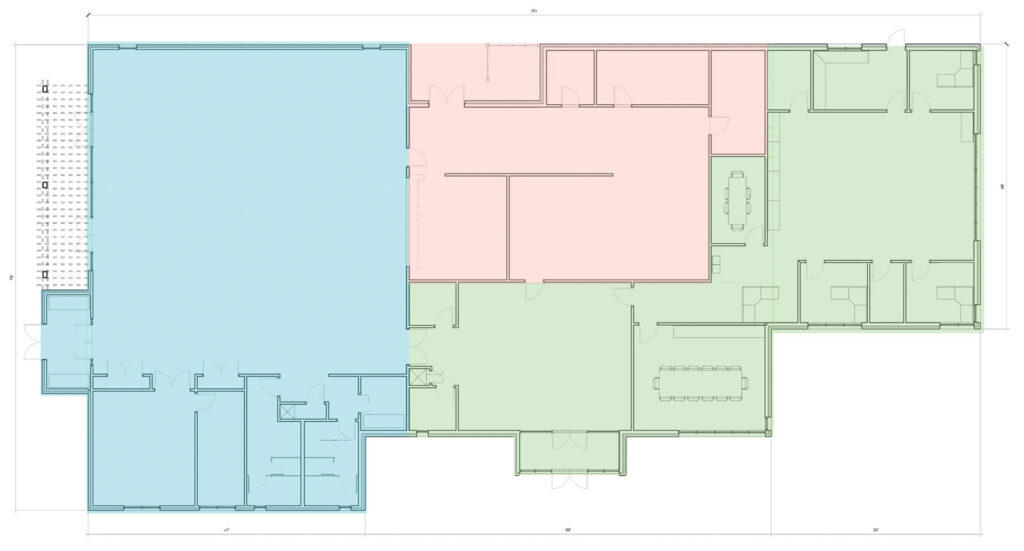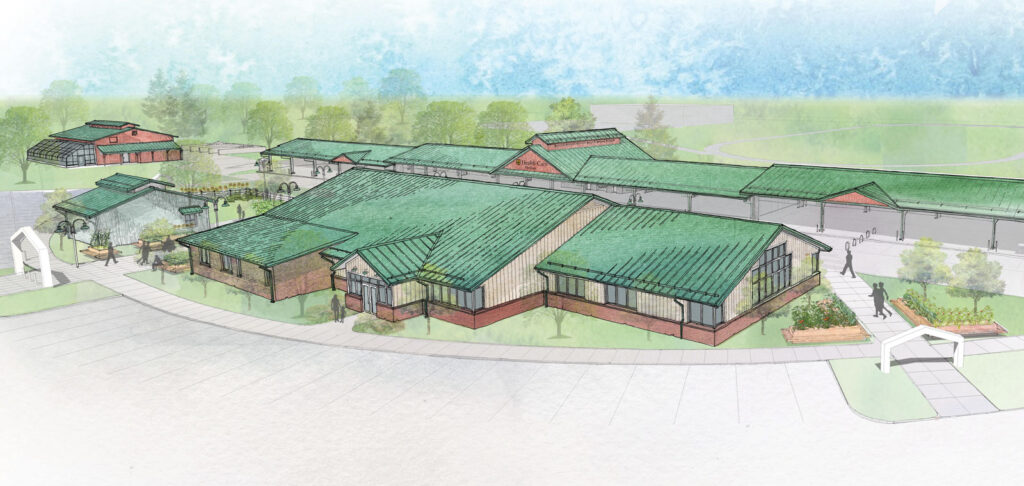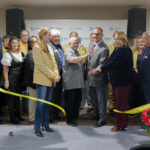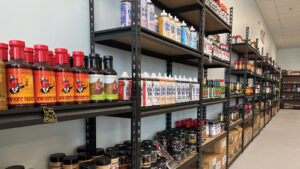With long-awaited groundbreaking, Columbia Center for Urban Agriculture’s community center is ready to bloom.
It all started with a composting project undertaken by a handful of friends at the University of Missouri. Collecting compost from local restaurants on bicycles with baskets, they created a community compost that would provide fertile soil for a neighborhood garden and for the seeds of Columbia Center for Urban Agriculture to germinate.
In the beginning, what brought people into the organization was the passion, excitement, and action of what was happening. Years on, those attributes continue to compel involvement from the deep root of collaboration.
Despite our complexity and differences, every human being has a hunger for food, and many also hunger for connection and a sense of purpose. Columbia Center for Urban Agriculture (CCUA) continues to address those unifying commonalities and deepen its community roots as the organization planned for the groundbreaking on the final component of Columbia’s Agriculture Park: the multi-purpose Community Welcome Center.
That groundbreaking happened on a sunny Saturday morning on September 14. The nonprofit that began as an all-volunteer group in 2008 will finally have a physical space, a tangible “center,” and the building will provide an entry for those interested in getting involved, getting help, or exploring partnership opportunities.
“It supports a lot of what we’ve already been doing and opens new doors for the impact our programming can make,” said Billy Polansky, CCUA’s executive director. To those ends, the 11,000-square-foot structure will feature a community event space, a resource center, and commercial kitchen, a conference meeting space, and offices for staff, affiliates, and volunteers.
Sponsorship opportunities still exist for naming the building itself as well as several spaces within the structure, but meanwhile, “The Center” seems an appropriate nickname for the hub and gathering place it will be for the myriad activities and programs it will house.

Flexible Space
Highlighted in Blue
4,000 sq ft
Flexible space
for classes, meetings, clinics, farm-to-table events, and more.
Kitchen:
Highlighted in Pink
2,000 sq ft
Kitchen for cooking classes, nutrition education, and rentable work space for entrepreneurs.
Resource Center:
Highlighted in Green
3,500 sq ft
A welcome center, resource library, meeting space, and office space for Ag Park program staff.
The Center also represents the latest public-private collaboration for CCUA. Columbia’s Agriculture Park itself was the first such alliance and was born when the group performed an analysis of what they considered to be underused properties in the Columbia Parks and Recreation Department. From early on, the group entertained “what if?” scenarios. The response came when the city of Columbia asked if CCUA would be interested in farming the ten-acre space next to the Activity and Recreation Center in the Clary-Shy Community Park. Never tackling projects solo, CCUA rounded up a group of potential participants and set to work on a plan.
The results have proven to be an inspirational success and meaningful addition to the community.
“It’s a sweet spot where Parks would not want to run something this complicated, and we would never have such a high-profile site but through this public-private partnership,” said Adam Saunders, CCUA’s co-founder and development director. “We trusted and leaned on each other and time has proven it’s worked as we have a great relationship and have created something really unique.”
Such cooperation has garnered attention from other nonprofits.
“We’re getting calls now from around the country asking, ‘What is this and how did you do this?’ on the public-private partnership and our programming,” he explained.
As for the funding for the park development, about half stems from private donations while the balance is comprised of public sources including American Rescue Plan Act (ARPA) dollars issued through Boone County, coupled with friendly financing from the Missouri Foundation for Health which allowed CCUA to leverage several million dollars of state tax credits that were due to expire.
While fundraising continues, donations from the McGarity and Edison-Fleming families represent significant contributions and named spaces.
“We’re so grateful to the donors who have stepped up and trusted us to steward this forward,” Saunders added. “It has been a dance of illustrating where we are going and how people can plug in financially or strategically and then for us to make decisions deliberately and carefully with these resources that we have been given.”
From its inception, CCUA adopted a collaborative spirit and thrived on community interest and support. Polansky considers Columbia an optimal environment for success in that, “Because it is small, it is easy to be connected to other organizations and other people, but because it is big it has some of the resources that a small town wouldn’t have.”
Last year, CCUA made use of nearly 9,500 hours volunteered by hundreds of locals. A diverse group including Mizzou students, retirees, local churches, and businesses has contributed time and reflects broad community support.
“One of the keys of our success is following through on the things we said we were going to do,” Polansky reflected. “Delivering on our promises has earned us trust and then new partnerships and new success and more opportunities to serve the community.” Saunders agreed that CCUA has been built on a foundation comprised of many heartening and admirable attributes including goodwill, reciprocity, and determination.
Those cornerstones, along with knowing when to say “yes” and when to say “no” to opportunities — and staying nimble as a small nonprofit — contribute to the group’s accomplishments.
“All of the programming is really done through strategic partnerships,” Saunders said. “We don’t do any of these things by ourselves.” As CCUA has pursued its vision of “a community transformed by good food for all and the skills to grow it,” its roster of initiatives has continually grown.
“We start through pilots and phases as we try new ideas,” Saunders explained. Those have now grown to include the Opportunity Gardens, where a partnership with the Columbia Housing Authority has facilitated over 600 families receiving materials and learning skills through mentorship for at-home gardeners.
- Planting for the Pantry entails fresh fruits and vegetables being farmed specifically for local food relief outlets such as the Food Bank Market. Individuals or entities can sponsor garden rows.
- Crates to Plates, where food is grown in recycled milk crates, is now housed at the Food Bank Market’s new location on the Business Loop.
- In a workforce development effort, a Market Garden Apprenticeship Program is offered, affording book learning and hands-on farmer training.
- Association with Compass Health Care and the Columbia Farmers Market helps with a Produce Prescription Program where weekly “doses” of produce are prescribed by a family’s healthcare provider and redeemable at the Market.
Market attendance has nearly doubled since making its permanent home at the MU Health Care Pavilion.
Columbia’s Agriculture Park is also home to a sizable educational farm with activities for kids and various seasonal workshops. The children’s hands-on PLANTS program emphasizes connections among food, health, and the environment as CCUA partners with local schools to introduce its “seed to plate” mission to youth. Further community outreach happens at the Mark and Carol Stevenson Veterans Urban Farm, where a collaboration with Truman Memorial Veteran’s Hospital provides apprenticeships, gardening-based therapies, and community events for local veterans.
Finally, as a fitting way to celebrate the year’s accomplishments, CCUA hosted its annual Harvest Hootenanny last month, one week after the long-awaited groundbreaking.
With food as a tap root of community, the tendrils of CCUA’s programs continue to stretch out and yield the beneficial social, environmental and health impacts of food, purpose, and connection.










